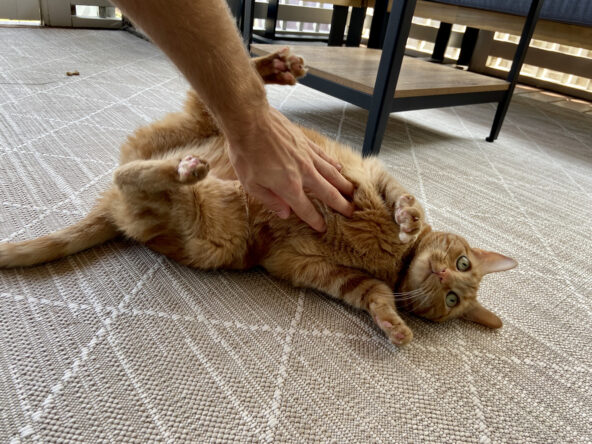If your cat thinks 3am is the perfect time to sprint down the hallway or yowl outside your bedroom door, you’re not alone.

Nighttime wake-ups are one of the most common issues cat owners deal with, and while it’s easy to blame it on “just being a cat,” there are ways to change the behaviour and regain a bit of your sanity (and peaceful REM). Here are a few ways to help your cat settle down and let you sleep through the night without the 4 a.m. chaos.
1. Tire them out before bed.

Cats are naturally more active at dawn and dusk, so if they’ve been snoozing all evening, they’ll likely be full of energy once you’re ready to wind down. Adding a proper play session before your own bedtime helps burn off that pent-up energy.
Use toys that mimic prey, such as wand toys or anything that makes them stalk and pounce, for at least 10–15 minutes. It helps trigger their hunt-rest cycle and leaves them more likely to crash out instead of acting like your hallway’s a racetrack at 2 a.m.
2. Don’t reward the wake-up calls.

It’s tempting to give in when your cat’s meowing wakes you up—but if you feed them, talk to them, or even push them out the door, you’re reinforcing the idea that making noise gets them attention.
As hard as it is in the moment, ignoring the behaviour is key. If they learn you won’t engage, no matter how persistent they are, they’ll eventually stop trying. Just make sure their basic needs are met before bedtime, so you’re not ignoring a real problem.
3. Feed them later in the evening.

Some cats wake you up because they’re genuinely hungry. If dinner’s served early and there’s nothing until the next morning, they’ll come looking for their next meal, and you might be the vending machine. Try giving a small meal just before bed to help them settle. Some owners even use timed feeders overnight to take the human element out of the routine. That way, your cat learns food comes from the bowl, not the human’s face at 4am.
4. Keep the bedroom off-limits if necessary.

If your cat is particularly active or disruptive at night, it might be time to gently enforce a boundary. Keeping your bedroom door closed can help protect your sleep—but only if your cat is already used to entertaining themselves elsewhere.
Make sure the rest of your home has cosy sleeping spots and enrichment so it doesn’t feel like punishment. It may take some protest meows at first, but eventually they get the message, especially if there’s nothing rewarding about scratching the door.
5. Create a nighttime routine they can predict.

Cats love consistency. If bedtime is a scattered mess, your cat will respond in kind. A predictable evening routine—feeding, playtime, wind-down, lights off—can signal that it’s time to settle down. Eventually, your cat will start to associate that flow with rest. If they know what’s coming next, they’re less likely to feel restless or confused about why the human suddenly stopped interacting with them.
6. Offer enrichment during the day.

A bored cat during the day often becomes a chaotic cat at night. If your cat spends most of the daylight hours sleeping out of boredom, they’ll be wide-eyed and ready to explore once you’re asleep. Try puzzle feeders, window perches, or rotating toys to keep them mentally engaged when you’re not around. A more stimulated cat is naturally better at syncing to a restful rhythm once the house goes quiet.
7. Don’t get angry—it makes things worse.

It’s easy to get frustrated when you’re woken up night after night. But yelling or physically shooing your cat can damage the trust they have in you, and it rarely stops the behaviour for good. Cats don’t respond well to negative attention. They’ll either become anxious or interpret it as excitement. Staying calm and consistent with your boundaries is far more effective than losing sleep and your temper.
8. Check for medical issues.

If the nighttime restlessness is sudden or unusually intense, it’s worth ruling out underlying health problems. Hyperthyroidism, pain, or cognitive changes in older cats can lead to pacing, vocalising, or general nighttime unrest. If you’ve tried adjusting their routine and nothing’s helped, a vet visit can give peace of mind, or catch something early that your cat can’t communicate any other way.
9. Make nighttime less stimulating.

Some cats wake up because something in the environment is triggering them. Noises outside, streetlights flickering, or household appliances humming can be enough to spark their curiosity or anxiety. Consider blackout curtains, white noise machines, or moving them to a quieter part of the house at night. If they’re naturally alert, anything that softens stimulation can help settle their instincts while you rest.
10. Be patient—habits take time to change.

Nighttime behaviour doesn’t change overnight. Even with the right strategies, it may take days or even weeks for your cat to adjust to new routines and expectations. The key is consistency without frustration. Stick to the plan, stay calm when they test boundaries, and remember—your cat’s not trying to ruin your sleep. They’re just being wired for a schedule that doesn’t match yours. With the right adjustments, you can meet in the middle.




